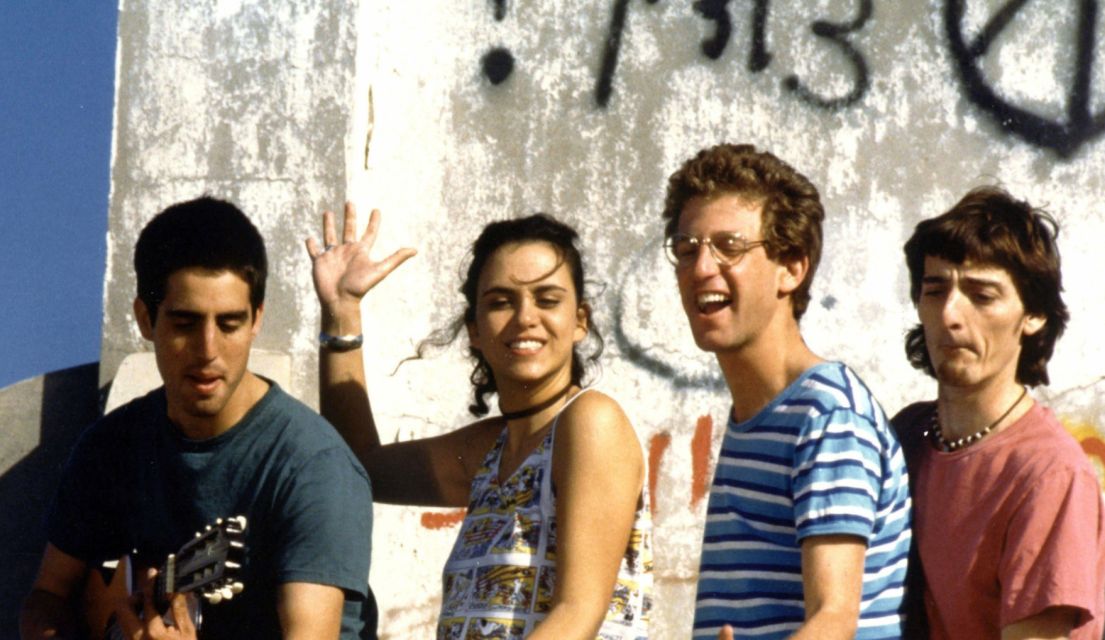This year’s 27th New York Jewish Film Festival has a well-put-together mix of new documentaries, film narratives, short films, and works by new filmmakers. It is a return to a world-class festival after a few years of errant choices, where films with questionable Jewish content were shown and odd showcases that had no real Jewish content were the norm. The selection committee this year did a marvelous job of selecting fine cinema with Jewish content from around the world — I counted more than 15 countries — providing a great lens on the diversity of the Jewish people.
Much to its credit, the festival also is providing an opportunity to see many of the great Israeli film classics that recently were restored in Israel; it also, and as usual, gives us the chance to examine works with the filmmakers present. Kudos to festival director Aviva Weintraub and selection committee chair Rachel Chanoff.
The festival opened with a screening of Moroccan director Nabil Ayouch’s “Razzia,” a fascinating look at Moroccan life and culture as reflected through five different personalities. The mix of characters, which includes Joe the Jewish restaurateur, provides an alluring look at the majesty of Casablanca. Daniel Najenson exposes a long-known but rarely discussed turn of the 20th century Buenos Aires Jewish prostitution ring in his acerbic Argentinian documentary “The Impure.” “The Invisibles,” a German film by Claus Raifle, sheds light on the story of 1,700 Jews who hid in Berlin during World War II — it’s an unimaginable story, but it’s true. “Sammy Davis, Jr.: I’ve Gotta Be Me” is a dazzling documentary by Sam Pollard about the talented black Jewish performer whose work enthralled three generations. I really liked the choice to show the documentary “The Prince and the Dybbuk,” by Piotr Rosolowski and Elwira Niewiera, about the Polish director Michal Waszynski, who hid his Jewish origins. Waszynski, who directed one of the great Yiddish films, “The Dybbuk,” had identity issues, and the documentary is nicely paired with that 1937 film at the festival. There will also be a world premiere of Alexander Rodnyansky’s 1990 “The Mission of Raoul Wallenberg,” a movie that explores the mysterious disappearance and death of the diplomat, who is one of the Righteous Among the Nations. And if you are in the mood for a good suspense thriller, catch “Across the Waters” from Danish filmmaker Nicolo Donato.
This year, as usual, Israel is well represented. Tzahi Grad’s “The Cousin” delves into the Israeli-Palestinian conflict with a dark comedic touch, as an Arab laborer hired by a progressive Israeli is accused of a crime. In the German/Israeli co-production “The Cakemaker,” Ofir Raul Graizer sensitively tells the story of a gay German baker and his encounter with the Israeli widow of the man they both loved. Chen Shelach’s documentary “Praise the Lord” digs deep into how pig farming and the sale of pork in Israel questioned some of the very tenets of the Zionist state. Amos Gitai, one of Israel’s foremost filmmakers, gives us “West of the Jordan River,” the festival’s closing night film, his attempt to give voice to Israelis and Palestinians dealing with Israel’s control of the West Bank. Gitai’s 2008 film, “One Day You’ll Understand,” about a middle-aged French businessman’s discovery of wartime letters that shockingly shows that his mother was Jewish, is a fitting tribute to the great actor Jeanne Moreau, who died this summer. Maya Zach’s 24 minute “Counterlight,” inspired by poet Paul Celan, rounds out the selection of newer Israeli films.
Three Israeli classics recently restored in Israel are being screened at Lincoln Center. Gilberto Tofano was brought from Italy to Israel in 1969 to make “Siege,” the first Israeli film to look at the impact of war on women. The film, with an outstanding cast — Gila Almagor, Yehoram Gaon, and Dahn Ben Amotz — is about how her husband’s closest friends keep the widow of a soldier killed in the Six Day War from moving on with her life. Rafi Bukaee’s 1986 “Avanti Popolo” struggles to look at war and how enemies somehow can relate and connect when they find themselves together after a conflict. This brilliant film, with a standout performance by Israeli Arab actor Salim Dau (seen most recently in “Fauda”) probably is Israel’s most potent anti-war film of all time. Renen Schorr’s “Late Summer Blues” was a groundbreaking 1988 film about a group of high school seniors about to go into the army. Schorr explored the motivation of young Israelis, a few of whom were questioning whether army service might be avoided. The film was one of the first to question compulsory military service and the Zionist ideal of being ready to die for your country.
The New York Jewish Film Festival is at Lincoln Center and is a co-production of the Jewish Museum and Film Society of Lincoln Center. It goes through January 23.
Eric Goldman teaches at Yeshiva University and Fairleigh Dickinson University. His interview show, “Jewish Cinematheque,” is on the Jewish Broadcasting Service and is available on most cable systems


























